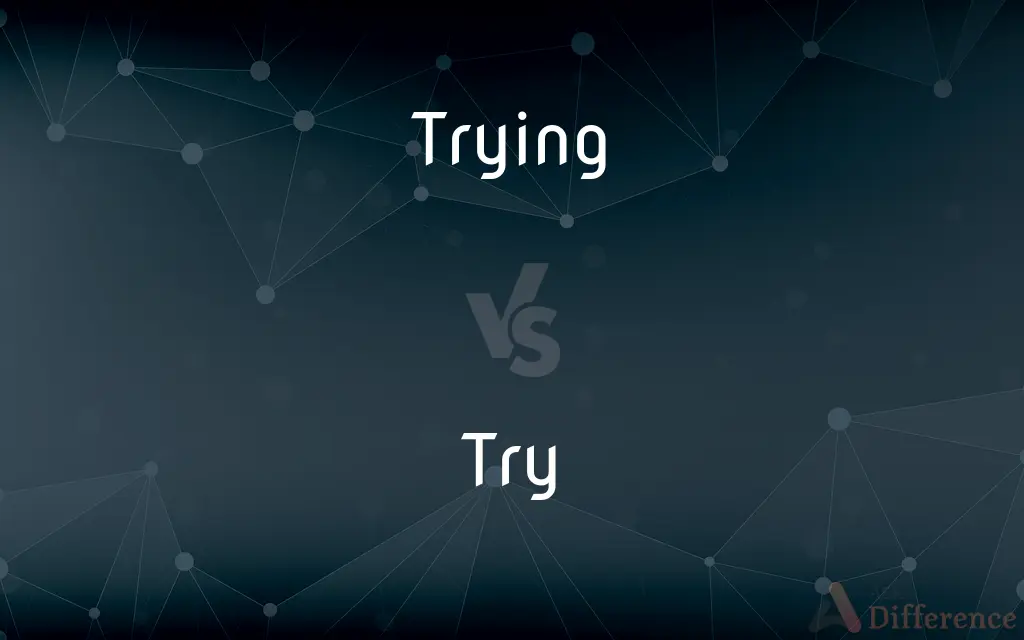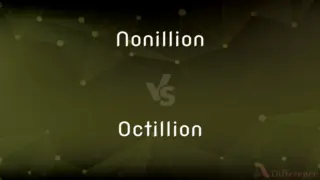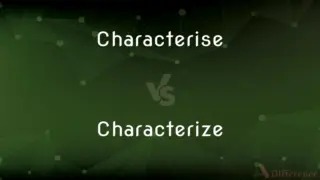Trying vs. Try — What's the Difference?
Edited by Tayyaba Rehman — By Urooj Arif — Updated on March 29, 2024
Trying is the present participle of try, indicating ongoing effort or attempt, while try is the base form, used for commands, infinitives, or to discuss general attempts.

Difference Between Trying and Try
Table of Contents
ADVERTISEMENT
Key Differences
Trying is used to describe an action that is currently ongoing, often implying a struggle or effort in the process. For instance, "She is trying to learn French" suggests a continuous effort. On the other hand, try refers to the act of attempting something, which can be a singular, discrete action or a general inclination to make an attempt, such as in "I try to learn a new word every day."
Trying, as the present participle, is versatile and can function as an adjective or form part of continuous verb tenses, conveying actions that are in progress in the present, past, or future. "The trying circumstances" highlights its adjective use. Whereas try, in its simplicity, forms the imperative mood, commands, and expressions of desire or intention, such as "Try harder next time."
Trying is often used in contexts where there is an implication of difficulty or challenge, emphasizing the process and its hardships. "He is trying to lift the heavy weight" focuses on the ongoing struggle. Try, however, can denote a singular attempt or a series of attempts without an inherent emphasis on the effort's duration or difficulty, as in "Try the door to see if it's locked."
In grammatical structure, trying requires auxiliary verbs to construct various tenses, playing a crucial role in indicating time and aspect of actions. "They were trying to call you" uses "were" as the auxiliary verb. Try functions without such support in simple present or future forms, such as "I will try to call them tomorrow."
The use of trying versus try can subtly affect the tone and emphasis of a sentence. Trying suggests a more vivid, ongoing narrative of effort, potentially engaging the reader with the immediacy of the action. In contrast, try might present an action as more abstract or planned, possibly invoking a sense of resolution or intention rather than process.
ADVERTISEMENT
Comparison Chart
Part of Speech
Present participle/Adjective
Base verb form
Tense Implication
Indicates ongoing action or state
Used for general attempts, commands, infinitives
Use in Sentences
Functions in continuous tenses, as an adjective
Used in simple present, future, commands
Connotation
Often implies effort or difficulty
Indicates an attempt, can be more neutral
Grammatical Support
Requires auxiliary verbs for tense formation
Can stand alone or with modal verbs
Compare with Definitions
Trying
Acting as the present participle of try.
She is trying to solve the puzzle.
Try
To attempt to do something.
I'll try to call him later.
Trying
Indicating ongoing effort.
They have been trying for hours.
Try
Used to make an effort or attempt.
Try pushing the door instead of pulling.
Trying
Expressing a continuous attempt in the past.
He was trying to reach you all day.
Try
In commands or advice.
Try the new restaurant in town.
Trying
Used as an adjective to describe difficult situations.
These are trying times for everyone.
Try
Expressing an experiment or test.
Try this method to solve the problem.
Trying
Highlighting the persistence in action.
She keeps trying despite the failures.
Try
To put someone on trial.
The court will try the case next month.
Trying
Causing strain, hardship, or distress.
Try
Make an attempt or effort to do something
I started to try and untangle the mystery
I decided to try writing fiction
He tried to regain his breath
Three times he tried the manoeuvre and three times he failed
Trying
Difficult to endure; arduous.
Try
Subject (someone) to trial
He was arrested and tried for the murder
Trying
Irritating, stressful or bothersome.
Try
Smooth (roughly planed wood) with a plane to give an accurately flat surface.
Trying
Present participle of try
Try
Extract (oil or fat) by heating
Some of the fat may be tried out and used
Trying
(philosophy) The act by which one tries something; an attempt.
Try
An effort to accomplish something; an attempt
He got his membership card on his third try
Trying
Adapted to try, or put to severe trial; severe; afflictive; as, a trying occasion or position.
Try
An act of touching the ball down behind the opposing goal line, scoring points and entitling the scoring side to a kick at goal.
Trying
Hard to endure;
Fell upon trying times
Try
To make an effort to do or accomplish (something); attempt
Tried to ski.
Trying
Extremely irritating to the nerves;
Nerve-racking noise
The stressful days before a war
A trying day at the office
Try
To taste, sample, or otherwise test in order to determine strength, effect, worth, or desirability
Try this casserole.
Try
To make an effort to open (a closed door or window).
Try
To conduct the trial of (a legal claim)
To try a negligence case.
Try
To put (an accused person) on trial.
Try
To subject to great strain or hardship; tax
The last steep ascent tried my every muscle.
Try
To melt (lard, for example) to separate out impurities; render.
Try
To make an effort; strive
I know it's not easy, but keep trying!.
Try
An attempt; an effort.
Try
(Sports) In rugby, an act of advancing the ball past the opponent's goal line and grounding it there for a score of three points.
Try
To attempt; to endeavour. Followed by infinitive.
I tried to rollerblade, but I couldn’t.
I'll come to dinner soon. I'm trying to beat this level first.
Try
(obsolete) To divide; to separate.
Try
To separate (precious metal etc.) from the ore by melting; to purify, refine.
Try
(one sort from another) To winnow; to sift; to pick out; frequently followed by out.
To try out the wild corn from the good
Try
(nautical) To extract oil from blubber or fat; to melt down blubber to obtain oil
Try
To extract wax from a honeycomb
Try
To test, to work out.
Try
To make an experiment. Usually followed by a present participle.
I tried mixing more white paint to get a lighter shade.
Try
To put to test.
I shall try my skills on this.
Try
(specifically) To test someone's patience.
You are trying my patience.
Don't try me.
Try
To receive an imminent attack; to take.
Try
To taste, sample, etc.
Oh, you need to try the soup of the day!
Try
To prove by experiment; to apply a test to, for the purpose of determining the quality; to examine; to prove; to test.
To try weights or measures by a standard;
To try a person's opinions
Try
(with indirect interrogative clause) To attempt to determine (by experiment or effort).
I'll try whether I can make it across town on foot.
Try
(legal) To put on trial.
He was tried and executed.
Try
To experiment, to strive.
Try
To have or gain knowledge of by experience.
Try
To work on something with one's best effort and focus.
Dad, for fuck's sake, I'm trying my best!
You are trying too hard.
Try
(obsolete) To do; to fare.
How do you try! (i.e., how do you do?)
Try
To settle; to decide; to determine; specifically, to decide by an appeal to arms.
To try rival claims by a duel;
To try conclusions
Try
To attempt to conceive a child.
Try
(nautical) To lie to in heavy weather under just sufficient sail to head into the wind.
Try
To strain; to subject to excessive tests.
The light tries his eyes.
Repeated failures try one's patience.
Try
To want
I am really not trying to hear you talk about my mama like that.
Try
An attempt.
I gave unicycling a try but I couldn’t do it.
Try
An act of tasting or sampling.
I gave sushi a try but I didn’t like it.
Try
(rugby) A score in rugby league and rugby union, analogous to a touchdown in American football.
Today I scored my first try.
Try
A screen, or sieve, for grain.
Try
(American football) A field goal or extra point
Try
(chess) A move that almost solves a chess problem, except that Black has a unique defense.
Try
(obsolete) Fine, excellent.
Try
To divide or separate, as one sort from another; to winnow; to sift; to pick out; - frequently followed by out; as, to try out the wild corn from the good.
Try
To purify or refine, as metals; to melt out, and procure in a pure state, as oil, tallow, lard, etc.
The words of the Lord are pure words: as silver tried in a furnace of earth, purified seven times.
For thou, O God, hast proved us: thou hast tried us, as silver is tried.
Try
To prove by experiment; to apply a test to, for the purpose of determining the quality; to examine; to prove; to test; as, to try weights or measures by a standard; to try a man's opinions.
Let the end try the man.
Try
To subject to severe trial; to put to the test; to cause suffering or trouble to.
Thus far to try thee, Adam, I was pleased.
These are the times that try men's souls.
Try
To experiment with; to test by use; as, to try a remedy for disease; to try a horse.
Come, try upon yourselves what you have seen me.
To ease her cares the force of sleep she tries.
Try
To strain; to subject to excessive tests; as, the light tries his eyes; repeated disappointments try one's patience.
Try
To examine or investigate judicially; to examine by witnesses or other judicial evidence and the principles of law; as, to try a cause, or a criminal.
Try
To settle; to decide; to determine; specifically, to decide by an appeal to arms; as, to try rival claims by a duel; to try conclusions.
Left I the court, to see this quarrel tried.
Try
To experience; to have or gain knowledge of by experience.
Or try the Libyan heat or Scythian cold.
Try
To essay; to attempt; to endeavor.
Let us try . . . to found a path.
He first deceased: she for a little triedTo live without him; liked it not, and died.
Alack, I am afraid they have a waked,And 't is not done. The attempt, and not the deed,Confounds us.
Try
To exert strength; to endeavor; to make an effort or an attempt; as, you must try hard if you wish to learn.
Try
To do; to fare; as, how do you try!
Try
A screen, or sieve, for grain.
Try
Act of trying; attempt; experiment; trial.
This breaking of his has been but a try for his friends.
Try
In Rugby and Northern Union football, a score (counting three points) made by grounding the ball on or behind the opponent's goal line; - so called because it entitles the side making it to a place kick for a goal (counting two points more if successful).
Try
Refined; select; excellent; choice.
Try
Earnest and conscientious activity intended to do or accomplish something;
Made an effort to cover all the reading material
Wished him luck in his endeavor
She gave it a good try
Try
Make an effort or attempt;
He tried to shake off his fears
The infant had essayed a few wobbly steps
The police attempted to stop the thief
He sought to improve himself
She always seeks to do good in the world
Try
Put to the test, as for its quality, or give experimental use to;
This approach has been tried with good results
Test this recipe
Try
Put on trial or hear a case and sit as the judge at the trial of;
The football star was tried for the murder of his wife
The judge tried both father and son in separate trials
Try
Take a sample of;
Try these new crackers
Sample the regional dishes
Try
Examine or hear (evidence or a case) by judicial process;
The jury had heard all the evidence
The case will be tried in California
Try
Give pain or trouble to;
I've been sorely tried by these students
Try
Test the limits of;
You are trying my patience!
Try
Melt (fat, lard, etc.) in order to separate out impurities;
Try the yak butter
Render fat in a casserole
Try
Put on a garment in order to see whether it fits and looks nice;
Try on this sweater to see how it looks
Common Curiosities
Can trying and try be used interchangeably?
No, they serve different grammatical functions and contexts; trying is a present participle, whereas try is the base verb form.
Is trying always related to difficulty?
Often, but not always. It implies effort which may or may not be difficult.
What is the difference between trying and try?
Trying refers to an ongoing action or effort, while try is the base form of the verb used to describe an attempt or effort.
How does the use of try in a sentence affect its meaning?
Try suggests an attempt or effort to do something, potentially with a singular or planned action.
Can try be used without an object?
Yes, in commands or suggestions, e.g., "Try harder."
Is trying a verb or an adjective?
It can function as both, depending on the context.
Can trying be used to describe an experiment?
Yes, it can describe ongoing experimental actions.
In what tense is trying used?
It is used in continuous tenses to indicate ongoing actions.
What does try mean in legal contexts?
It means to examine a case in court.
Can both trying and try be used to describe future actions?
Yes, but with different constructions; "trying" needs auxiliary verbs, while "try" can be used with modal verbs.
What is the infinitive form of trying?
The infinitive form is "to try."
How does try function in imperative sentences?
As a command or suggestion, e.g., "Try to be on time."
Is it correct to say 'I am try'?
No, the correct form is "I am trying."
Is there a noun form of try?
Yes, "try" can also be a noun meaning an attempt.
How do trying and try relate to persistence?
Trying emphasizes ongoing effort and persistence, while try can indicate a singular or initial effort to do something.
Share Your Discovery

Previous Comparison
Nonillion vs. Octillion
Next Comparison
Characterise vs. CharacterizeAuthor Spotlight
Written by
Urooj ArifUrooj is a skilled content writer at Ask Difference, known for her exceptional ability to simplify complex topics into engaging and informative content. With a passion for research and a flair for clear, concise writing, she consistently delivers articles that resonate with our diverse audience.
Edited by
Tayyaba RehmanTayyaba Rehman is a distinguished writer, currently serving as a primary contributor to askdifference.com. As a researcher in semantics and etymology, Tayyaba's passion for the complexity of languages and their distinctions has found a perfect home on the platform. Tayyaba delves into the intricacies of language, distinguishing between commonly confused words and phrases, thereby providing clarity for readers worldwide.
















































